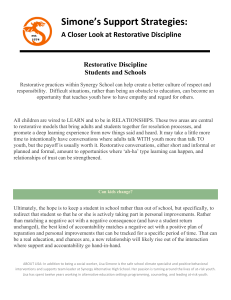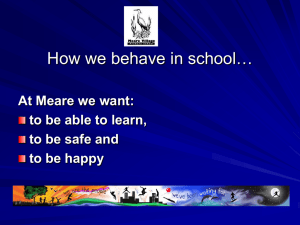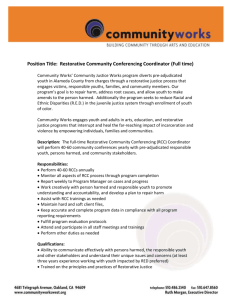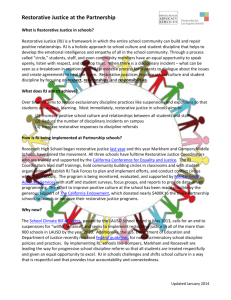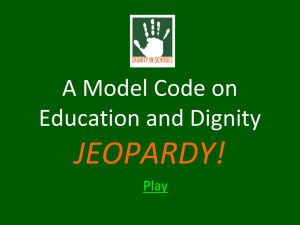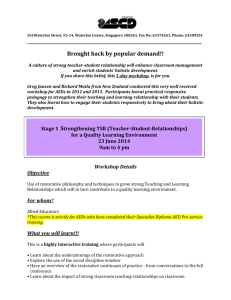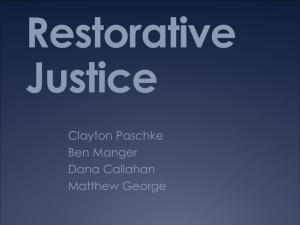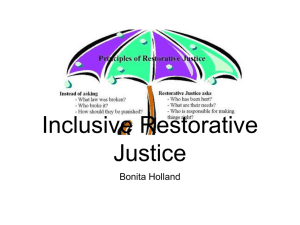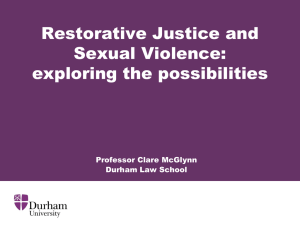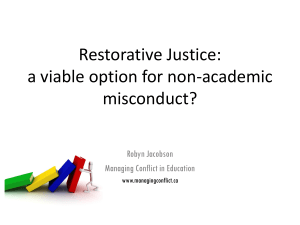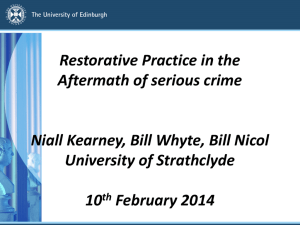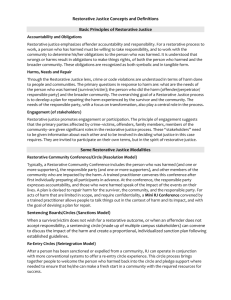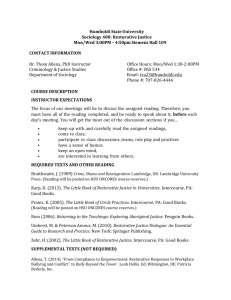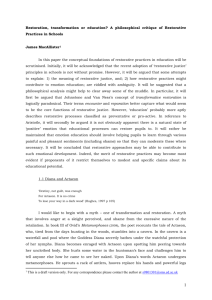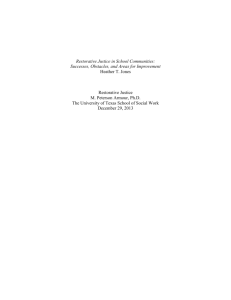Resources/Research - Lives in the Balance
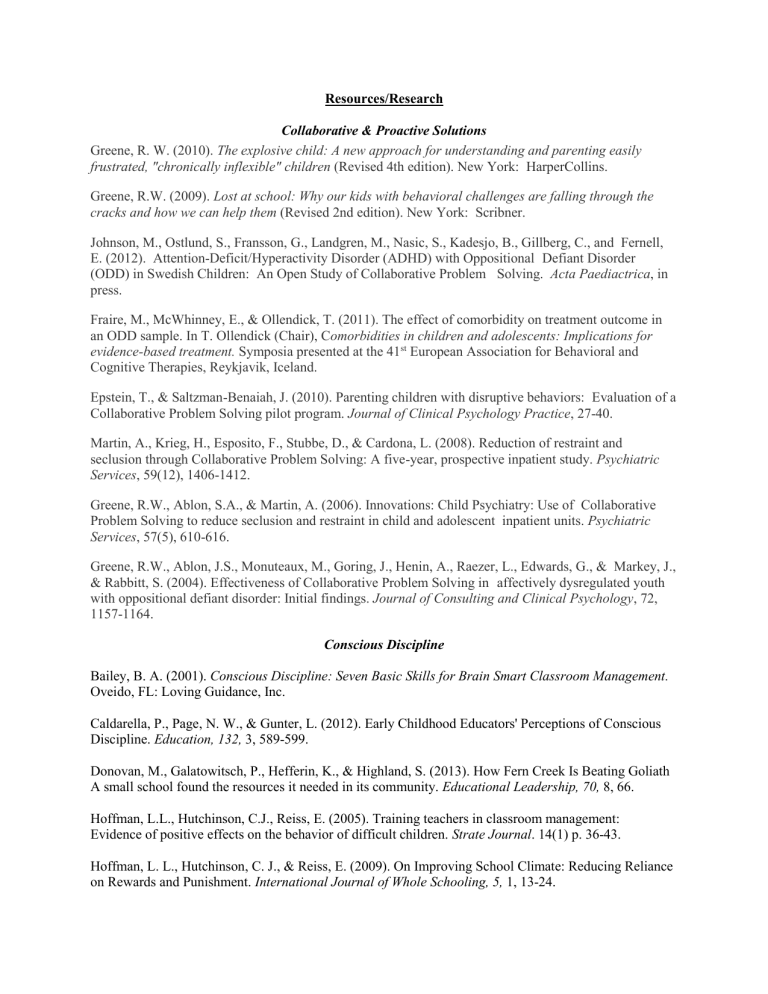
Resources/Research
Collaborative & Proactive Solutions
Greene, R. W. (2010). The explosive child: A new approach for understanding and parenting easily frustrated, "chronically inflexible" children (Revised 4th edition). New York: HarperCollins.
Greene, R.W. (2009). Lost at school: Why our kids with behavioral challenges are falling through the cracks and how we can help them (Revised 2nd edition). New York: Scribner.
Johnson, M., Ostlund, S., Fransson, G., Landgren, M., Nasic, S., Kadesjo, B., Gillberg, C., and Fernell,
E. (2012). Attention-Deficit/Hyperactivity Disorder (ADHD) with Oppositional Defiant Disorder
(ODD) in Swedish Children: An Open Study of Collaborative Problem Solving. Acta Paediactrica , in press.
Fraire, M., McWhinney, E., & Ollendick, T. (2011). The effect of comorbidity on treatment outcome in an ODD sample. In T. Ollendick (Chair), C omorbidities in children and adolescents: Implications for evidence-based treatment.
Symposia presented at the 41 st European Association for Behavioral and
Cognitive Therapies, Reykjavik, Iceland.
Epstein, T., & Saltzman-Benaiah, J. (2010). Parenting children with disruptive behaviors: Evaluation of a
Collaborative Problem Solving pilot program. Journal of Clinical Psychology Practice , 27-40.
Martin, A., Krieg, H., Esposito, F., Stubbe, D., & Cardona, L. (2008). Reduction of restraint and seclusion through Collaborative Problem Solving: A five-year, prospective inpatient study. Psychiatric
Services , 59(12), 1406-1412.
Greene, R.W., Ablon, S.A., & Martin, A. (2006). Innovations: Child Psychiatry: Use of Collaborative
Problem Solving to reduce seclusion and restraint in child and adolescent inpatient units. Psychiatric
Services , 57(5), 610-616.
Greene, R.W., Ablon, J.S., Monuteaux, M., Goring, J., Henin, A., Raezer, L., Edwards, G., & Markey, J.,
& Rabbitt, S. (2004). Effectiveness of Collaborative Problem Solving in affectively dysregulated youth with oppositional defiant disorder: Initial findings. Journal of Consulting and Clinical Psychology , 72,
1157-1164.
Conscious Discipline
Bailey, B. A. (2001). Conscious Discipline: Seven Basic Skills for Brain Smart Classroom Management.
Oveido, FL: Loving Guidance, Inc.
Caldarella, P., Page, N. W., & Gunter, L. (2012). Early Childhood Educators' Perceptions of Conscious
Discipline. Education, 132, 3, 589-599.
Donovan, M., Galatowitsch, P., Hefferin, K., & Highland, S. (2013). How Fern Creek Is Beating Goliath
A small school found the resources it needed in its community. Educational Leadership, 70, 8, 66.
Hoffman, L.L., Hutchinson, C.J., Reiss, E. (2005). Training teachers in classroom management:
Evidence of positive effects on the behavior of difficult children. Strate Journal . 14(1) p. 36-43.
Hoffman, L. L., Hutchinson, C. J., & Reiss, E. (2009). On Improving School Climate: Reducing Reliance on Rewards and Punishment. International Journal of Whole Schooling, 5, 1, 13-24.
Nonviolent Communication
Marlow, E., Nyamathi, A., Grajeda, W. T., Bailey, N. Weber, A., & Younger, J. (2012). Nonviolent communication training and empathy in male parolees. Journal of Correctional Health Care. 8-19.
Rosenberg, M. B. (2003). Nonviolent Communication: A Language of Life.
Second Edition. Encinitas,
CA: PuddleDancer Press.
Rose, L. (2007). Nonviolent Communication: A Tool for Working with Children Who Have Emotional or
Behavioral Challenges. General Music Today, 19, 2, 35-36.
Positive Parenting
Holden, G.W. (2012). Discipline and punishment . In Oxford Bibliographies Online: Childhood studies.
H. Montgomery (Ed.). New York: Oxford University Press. http://oxfordbibliographiesonline.com/
Mrug, S., Elliott, M., Gilliland, M. J., Grunbaum, J. A., Tortolero, S. R., Cuccaro, P., & Schuster, M.
(2008). Positive parenting and early puberty in girls: protective effects against aggressive behavior. Archives of Pediatrics & Adolescent Medicine, 162, 8, 781-6.
Resolving Conflict Creatively Program
Aber, J. Lawrence, Joshua L. Brown, and Christopher C. Henrich, Teaching Conflict Resolution, An
Effective School-Based Approach to Violence Prevention, New York: National Center for Children in
Poverty, 1999.
Aber, J. Lawrence, Joshua L. Brown, and Stephanie M. Jones, "Developmental Trajectories Toward
Violence in Middle Childhood: Course, Demographic Differences, and Response to School-Based
Intervention," Developmental Psychology, Vol. 39, No. 2, 2003, pp. 324-348.
Aber, J. Lawrence, Stephanie M. Jones, Joshua L. Brown, Nina Chaudry, and Faith Samples, Resolving
Conflict Creatively: Evaluating the Developmental Effects of a School-Based Violence Prevention
Program in the Neighborhood and Classroom Context. Development and Psychopathology, Vol. 10,
1998, pp. 187-213.
Restorative Justice
Bonta, J., Wallace-Capretta, S., Rooney, J, & Mcanoy, K. (2002). An outcome evaluation of restorative justice alternative to incarceration . Contemporary Justice Review, 5 (4).
Kuo, S. Y., Longmire, D., & Cuvelier, S. J. (2010). An empirical assessment of the process of restorative justice. Journal of Criminal Justice, 38, 3, 318-328.
Rodriguez, N. (2007). Restorative Justice at Work: Examining the Impact of Restorative Justice
Resolutions on Juvenile Recidivism. Crime & Delinquency, 53, 3, 355-379.
Schiff, M. (2013). Dignity, disparity and desistance: effective restorative justice strategies to plug the
“school-to-prison pipeline.” http://www.restorativejustice.org/research
Schiff, M. F. & Bazemore, Gordon (2001). Restorative Community Justice: Repairing harm and transforming communities.
Cincinnati, OH: Anderson Publishing Co.
Umbreit, M. S., Coates, R. B & Vos, B. (2007). Restorative justice dialogue: A multi-dimensional, evidence-based practice theory. Contemporary Justice Review, 10 (1).
Social Thinking
Crooke, P. J., Hendrix, R. E. & Rachman, J. Y. (2008). Brief report: Measuring the effectiveness of teaching social thinking to children with Asperger syndrome and high functioning autism. Journal of
Autism and Developmental Disorders, 38 (3), pp. 581-591.
Lee, K.Y.S., Lui, A.L.Y., Kan, P.P.K., Luke, K.M., Mak, Y.M., Cheung, P.M.P., Cheng, L. & Wong, I.
(2009). A case series of Social Thinking training of mainstreamed secondary school students with highfunctioning autism. Hong Kong Journal of Mental Health , 35(1), 10-17.
Winner, M. & Crooke, P. (2009) Social Thinking: A Training Paradigm for Professionals and Treatment
Approach for Individuals with Social Learning/Social Pragmatic Challenges. Perspectives on Language
Learning and Education , 16 62–69.
